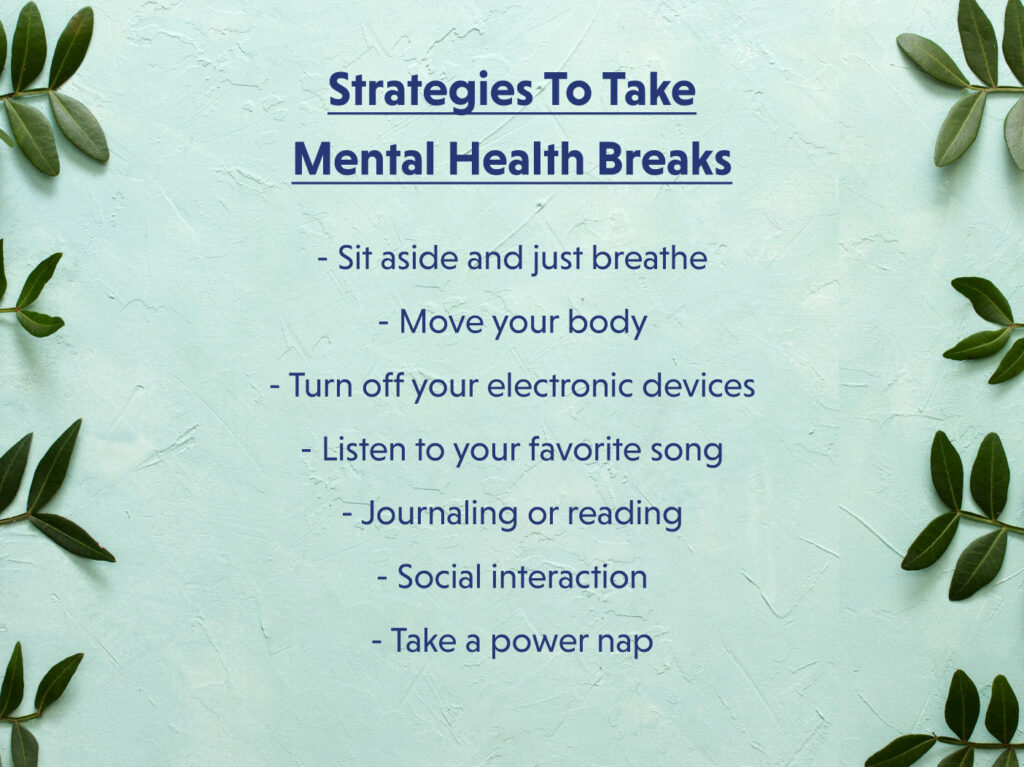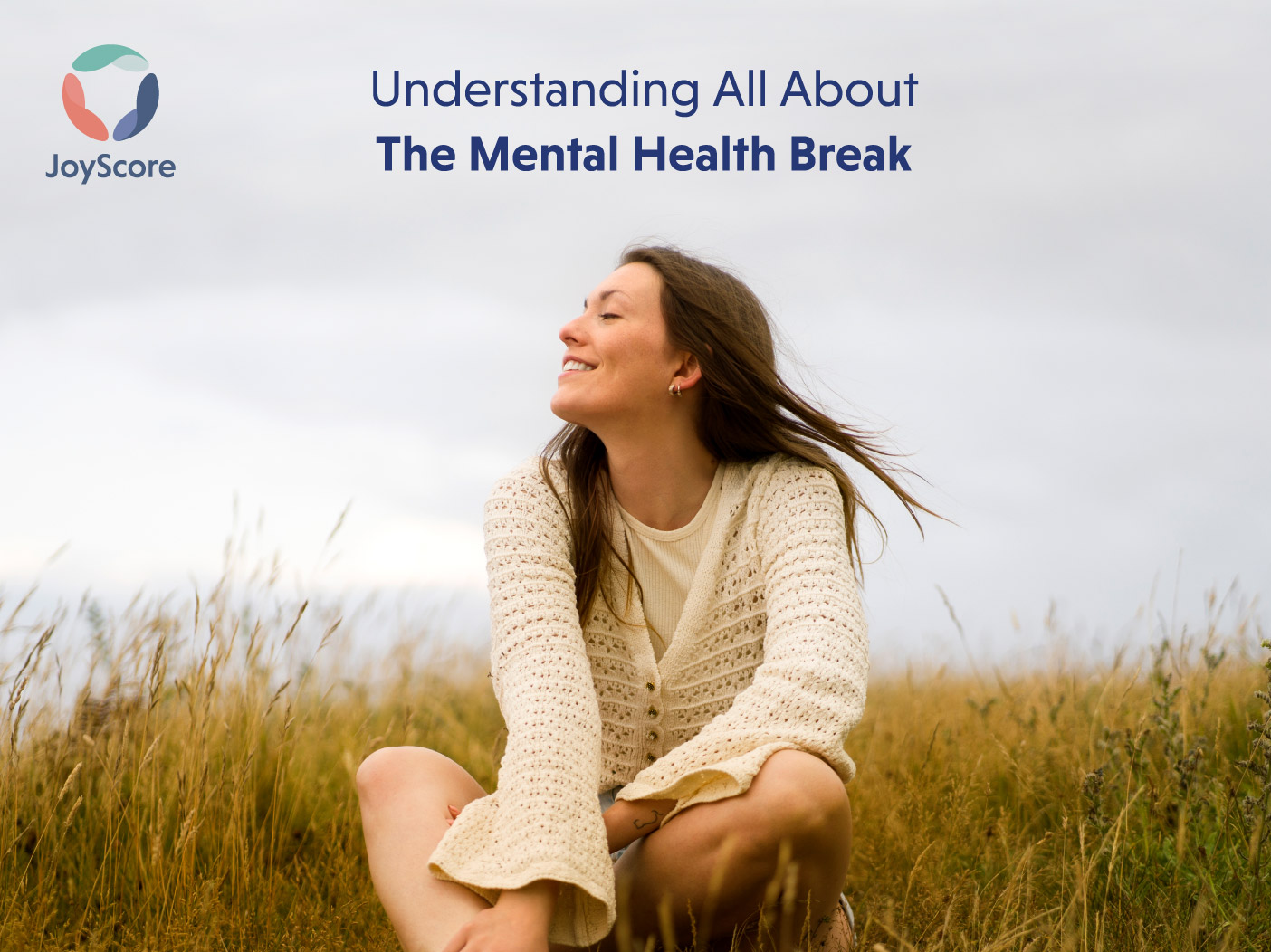Many of us are probably aware of the term nervous breakdown or mental breakdown, but what does this mean? A mental breakdown or nervous breakdown is the result of not taking care of our mental health. Pouring all your energy and focus on work and family responsibilities can drain you and result in an imbalance in your mind, body and soul. If you carve out at least 10 minutes a day for your mind, you will instantly be refreshed and have a better mood.
SIGNS YOU NEED A MENTAL HEALTH BREAK
MENTAL SIGNS
- Withdrawal symptoms- the individual will be disinterested to join the company of his family and friends and prefer to stay isolated.
- Feeling indecisive and unable to concentrate.
- Feeling depersonalized i.e. unable to feel like themselves.
- Feeling delusional and having hallucinations.
- Feeling low mood or burn out with emotional outbursts of anger, fear or frustration.
- Gets easily triggered and experiences anxiety symptoms which are difficult to manage on their own.
- Feel paranoid i.e. one will have a persistent and irrational feeling that people are always after them. This creates a situation of distrust and social anxiety.
- Having suicidal thoughts -in this situation the individual needs immediate attention by a professional therapist
PHYSICAL SIGNS
- Feeling tired and exhausted- the individual will face difficulty in carrying out normal routine tasks because of lack of energy.
- Muscle soreness and spasm – they will feel pain and restriction during movement especially in the neck, back and calf muscles.
- More prone to infections and frequently showing symptoms like cough, cold and fever.
- Disturbed bowel movement- despite any underlying infection, the person will frequently suffer from diarrhea, constipation, stomach cramps or bloating. At times, they may also start overeating or skipping meals which leads to unhealthy eating.
- Difficult getting asleep or disrupted sleep.
- Hot or cold flushes or sweaty hands and feet.
- Panic attack – it will include various symptoms
- such as racing heart, shortness of breath, dizziness and muscle tension.
.
MENTAL HEALTH BREAK BENEFITS
- Breaks reduce stress
If you are taking time in your day to have some ME time from your busy schedule, it prevents building up stress in your body and mind. One can avoid experiencing chronic stress or burnout with breaks. You don’t need to wait for a long holiday break to give your mind some rest.
- Breaks give a boost to creativity
Creative ideas often pop up in a fresh mind. So, if you are struggling to find a creative solution, step away for a while and gain a new perspective on the matter.
- Breaks uplift the mood
Breaks are not always about resting or sleeping, but engaging in something you love can also help you relax. So, if you are feeling sad or depressed because of a heavy overload, you must allow yourself to enjoy a relaxing hobby like doodling or cooking.
- Breaks are good for memory
Students are able to retain more information during exams if they had a sound sleep the night before. This works with other professions also where frequent break times give the mind a chance to review and engrain what they have learned to perform better.
- Breaks prevent fatigue
If you are not letting your mind and body relax after every 25 minutes of work, it will start draining your energy. So, frequent breaks help you to maintain your energy levels and remain focused without exhaustion. It makes you more productive as it restores your motivation for long periods of time.
STRATEGIES TO TAKE MENTAL BREAKS
Most of the time people turn to unhealthy means to unwind from stress and a hectic schedule. They smoke, drink, overeat or avoid their loved ones, which are not good signs. Here are some simple ways to boost your mental health when you have a busy schedule.

- Sit aside and just breathe
This is an immediate way to relax when you feel stressed. Do deep breathing with your eyes closed for 4-5 minutes. Try the 4-7-8 technique in which you inhale and hold the breath for 7 seconds and then exhale for 8 seconds. This gives you a fresh perspective of life.
- Move your body
When you are focusing on the negative for hours, it is destructive to your mental health. So, you need a quick shake which includes
- standing
- shaking your legs and arms
- jump up and down
- stretch for 30 seconds
- go out for a walk in the fresh air
- Turn off your electronic devices
Although technology is all that you need to progress, staying glued to the phones and laptops for hours can be emotionally draining. So, a digital detox must be part of your mental health break. You will regain your strength as you meditate or relax without distraction.
- Listen to your favorite song
Music gives a sense of comfort and elevates your mood. It sparks happiness even if you are feeling stressed and overwhelmed. So, play your favorite song while sitting in a relaxing corner with a glass of juice.
- Journaling or reading
Books have a profound impact on your mental as well as emotional health. Reading for about half an hour enhances cognitive function and offers support and a refuge from challenges of daily life.
Similarly, journaling also helps to deal with stress, anxiety and depression of daily living. If one makes it a habit of writing their thoughts or whatever comes to their mind on paper for 20 minutes a day, it will be beneficial to their mind. Also, try making a list of things you are grateful for, no matter how small. Journaling promotes emotional regulation, enhances self awareness and strengthens resilience in the face of challenges.
- Social interaction
Other than building a strong support system, spending time with a friend or loved one can lower the rate of anxiety and stress. One is able to talk through problems and share their feelings. It gives a sense of meaning and purpose to life by enhancing self esteem and mood. Also, be sure to schedule time with your friends in person on a regular basis to strengthen your bond.
- Take a power nap
A 20-minute daytime nap can help you feel relaxed, increase your alertness, and improve your mood. So if you feel exhausted, rather than fighting through the urge to rest, take a short nap if possible.
CONCLUSION
Taking a mental health break means distancing yourself from a stressful life or work routine to rebalance your body, mind and soul. Follow these tips above to help you take more mental health breaks throughout your day and help prevent a mental health breakdown.
Download the JOYSCORE app to add more healthy and joyful years to your life.
Download on the Appstore
Get it on Google Play



